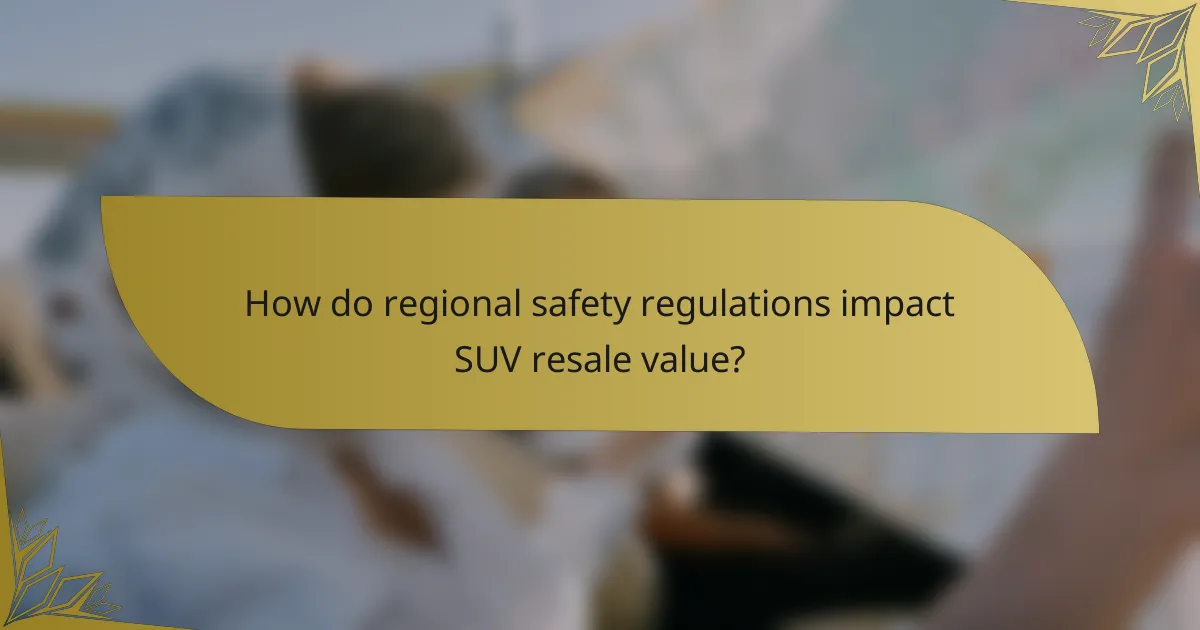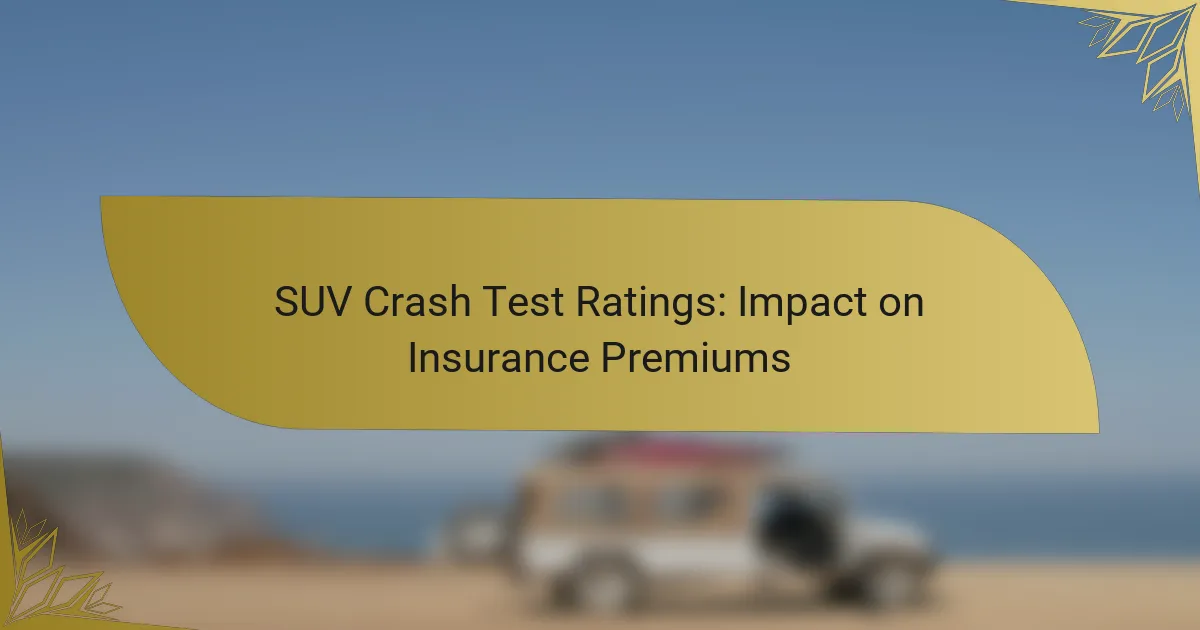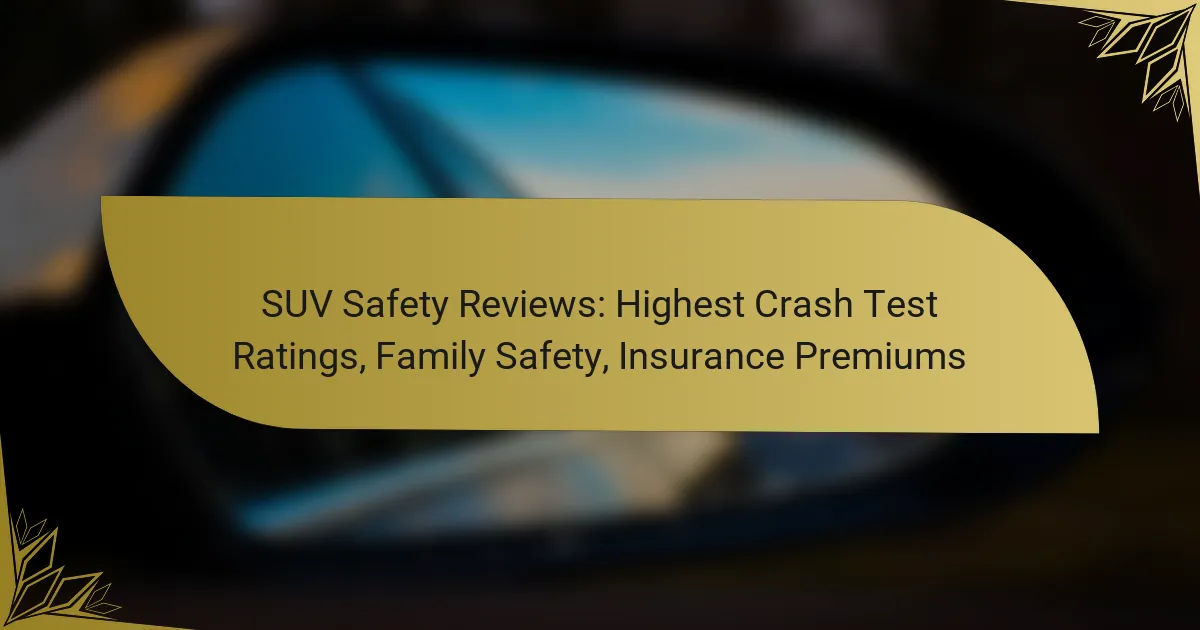The resale value of SUVs is heavily impacted by crash test ratings, as vehicles with higher safety scores tend to command better market prices. Buyers increasingly prioritize safety, making SUVs with strong safety records from organizations like the NHTSA and IIHS more desirable. Additionally, advanced safety features and robust structural designs further enhance resale value, reflecting consumer demand for protection and reliability.

How do crash test ratings affect SUV resale value?
Crash test ratings significantly influence SUV resale value, as higher ratings typically lead to better market prices. Buyers often prioritize safety, making vehicles with strong safety records more desirable and valuable.
Higher ratings lead to better resale prices
Vehicles that receive high crash test ratings from reputable organizations, such as the National Highway Traffic Safety Administration (NHTSA) or the Insurance Institute for Highway Safety (IIHS), tend to command higher resale prices. For example, an SUV rated five stars may sell for several thousand dollars more than a similar model rated three stars.
When shopping for an SUV, consider checking its safety ratings before purchasing. A strong safety record can enhance long-term value and appeal to future buyers, especially in markets where safety is a top concern.
Low ratings decrease market demand
Conversely, SUVs with low crash test ratings often face decreased demand, leading to lower resale values. Vehicles that score poorly may deter potential buyers who prioritize safety, resulting in longer selling times and reduced offers.
For instance, an SUV with a two-star rating may see its resale value drop significantly compared to its higher-rated counterparts. Sellers should be aware that low safety ratings can impact their ability to sell quickly and at a favorable price.

Which SUVs have the best crash test ratings?
The SUVs with the best crash test ratings typically receive high marks from organizations like the National Highway Traffic Safety Administration (NHTSA) and the Insurance Institute for Highway Safety (IIHS). These ratings reflect the vehicles’ performance in various safety tests, influencing their resale value and consumer appeal.
Toyota RAV4 ratings
The Toyota RAV4 consistently earns top ratings in crash tests, often receiving five-star ratings from the NHTSA and being named a Top Safety Pick by the IIHS. Key safety features such as adaptive cruise control, lane departure warning, and automatic emergency braking contribute to its strong performance.
When considering the RAV4, it’s important to check the specific model year, as safety ratings can vary slightly. Generally, models from the last few years have maintained high standards, making them a reliable choice for safety-conscious buyers.
Honda CR-V ratings
The Honda CR-V also boasts excellent crash test ratings, frequently achieving five-star ratings from the NHTSA and Top Safety Pick status from the IIHS. Its advanced safety technologies, including collision mitigation braking and road departure mitigation, enhance its safety profile.
As with the RAV4, potential buyers should verify the safety ratings for the specific model year they are interested in. Recent models have shown a strong commitment to safety, making the CR-V a competitive option in the SUV market.

What are the top safety features that influence resale value?
The resale value of SUVs is significantly influenced by safety features, particularly those that enhance driver and passenger protection. Buyers often prioritize vehicles with advanced safety technologies and robust structural designs, which can lead to higher resale prices.
Advanced driver-assistance systems
Advanced driver-assistance systems (ADAS) are crucial for enhancing safety and can positively impact resale value. Features such as adaptive cruise control, lane-keeping assist, and automatic emergency braking not only improve safety but also appeal to buyers looking for modern technology.
Vehicles equipped with ADAS often command higher prices in the used market, as these features are increasingly seen as essential. For instance, SUVs with comprehensive ADAS packages can see resale values increase by several thousand dollars compared to similar models without these systems.
Structural integrity and design
The structural integrity and design of an SUV play a vital role in its safety ratings and resale value. A well-engineered vehicle that meets or exceeds crash test standards is more likely to attract buyers who prioritize safety.
For example, SUVs that have received high ratings from organizations like the National Highway Traffic Safety Administration (NHTSA) or the Insurance Institute for Highway Safety (IIHS) tend to retain their value better. Buyers often look for models with reinforced frames and crumple zones, which can significantly enhance perceived safety and resale potential.

How can consumers assess crash test ratings?
Consumers can assess crash test ratings by reviewing evaluations from recognized organizations that test vehicle safety. These ratings provide insights into how well a vehicle protects its occupants in the event of a collision.
Using the IIHS ratings
The Insurance Institute for Highway Safety (IIHS) offers detailed crash test ratings based on various tests, including moderate overlap front, side, roof strength, and head restraints. Vehicles are rated as “Good,” “Acceptable,” “Marginal,” or “Poor,” with “Good” being the highest rating.
When evaluating IIHS ratings, consider the specific tests that a vehicle has undergone. A vehicle with high ratings across multiple categories is generally a safer choice. For example, a vehicle rated “Good” in both side and front tests is likely to perform well in real-world scenarios.
Consulting NHTSA safety ratings
The National Highway Traffic Safety Administration (NHTSA) provides a star rating system, with a maximum of five stars indicating the highest level of safety. This system assesses frontal crash, side crash, and rollover resistance.
To effectively use NHTSA ratings, look for vehicles with four or five stars overall. These ratings can help consumers make informed decisions, especially when comparing similar models. Additionally, pay attention to the specific star ratings for each category, as they can highlight strengths or weaknesses in a vehicle’s safety performance.

What is the relationship between safety recalls and resale value?
Safety recalls can significantly impact the resale value of SUVs, as they often lead to consumer concerns about reliability and safety. Vehicles with a history of frequent recalls tend to sell for lower prices due to perceived risks and diminished trust among potential buyers.
Frequent recalls lower resale prices
When an SUV experiences multiple recalls, its resale value typically decreases. Buyers are often wary of vehicles with a history of safety issues, leading to lower demand and prices. For instance, an SUV with several recalls might see its value drop by a noticeable percentage compared to similar models without such issues.
Moreover, the severity of the recalls plays a role; recalls related to critical safety features, such as brakes or airbags, can have a more pronounced effect on resale value than minor issues. This trend underscores the importance of researching a vehicle’s recall history before purchasing.
Transparency in recalls builds consumer trust
Transparency regarding safety recalls can enhance consumer trust and potentially stabilize resale values. When manufacturers openly communicate about recalls and provide clear solutions, buyers are more likely to feel confident in their purchase. This trust can mitigate the negative impact on resale prices.
For example, if a manufacturer promptly addresses a recall and offers free repairs or replacements, it can reassure buyers about the vehicle’s safety. This proactive approach can help maintain a more favorable resale value compared to brands that are less forthcoming about their recall issues.

How do regional safety regulations impact SUV resale value?
Regional safety regulations significantly influence SUV resale value by determining the safety standards that vehicles must meet. SUVs that comply with stringent local regulations often retain higher resale values due to perceived safety and reliability among buyers.
State-specific safety standards
Each state may have unique safety standards that vehicles must adhere to, affecting their resale value. For example, states like California enforce stricter emissions and safety regulations, which can lead to higher demand for compliant SUVs. Conversely, in states with less stringent regulations, resale values may be lower due to a larger supply of vehicles that do not meet higher safety benchmarks.
When considering an SUV purchase, it’s essential to check if the vehicle meets local safety standards. SUVs that exceed these requirements often command better resale prices, as buyers prioritize safety features.
Local market preferences for safety features
Local market preferences can greatly affect the resale value of SUVs, particularly regarding safety features. Areas with higher accident rates may see increased demand for vehicles equipped with advanced safety technologies, such as automatic emergency braking or lane-keeping assist. This demand can drive up resale values for SUVs that include these features.
Understanding local buyer preferences is crucial. For instance, in urban areas where traffic congestion is common, SUVs with superior safety ratings and features may sell for tens of percent more than those without. Researching local trends can help sellers and buyers make informed decisions about pricing and feature prioritization.

What are the emerging trends in SUV safety and resale value?
Emerging trends in SUV safety and resale value indicate a growing importance of crash test ratings and advanced safety features. Consumers are increasingly prioritizing vehicles that not only perform well in safety tests but also retain their value over time.
Increased consumer focus on safety technology
As safety technology evolves, consumers are more inclined to choose SUVs equipped with advanced features such as automatic emergency braking, lane-keeping assist, and adaptive cruise control. These technologies not only enhance safety but also positively influence resale value, as buyers are willing to pay a premium for vehicles that offer these capabilities.
For instance, SUVs that receive high ratings from organizations like the National Highway Traffic Safety Administration (NHTSA) or the Insurance Institute for Highway Safety (IIHS) tend to maintain their value better than those with lower ratings. This trend underscores the importance of researching safety ratings before purchasing an SUV.
Impact of electric SUVs on safety ratings
The rise of electric SUVs is reshaping safety ratings, as these vehicles often incorporate innovative design elements that enhance safety. Electric SUVs typically have a lower center of gravity due to their battery placement, which can reduce rollover risks and improve stability.
Moreover, many electric SUVs come equipped with the latest safety technologies, which can further boost their ratings. As the market for electric vehicles grows, consumers should consider how these factors may affect both safety performance and resale value in the long term.



